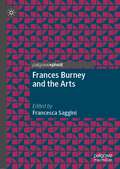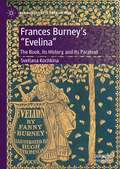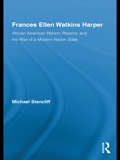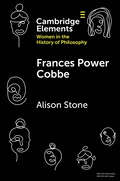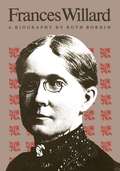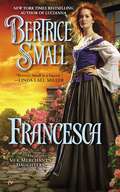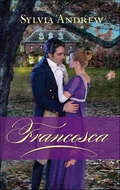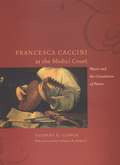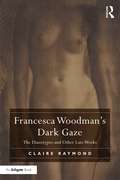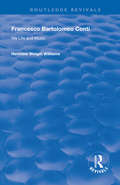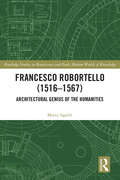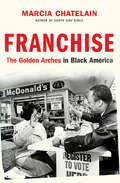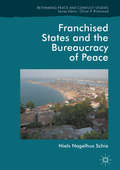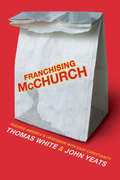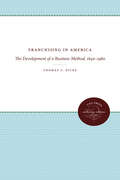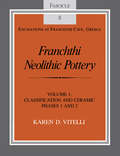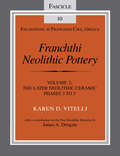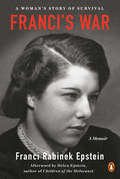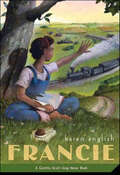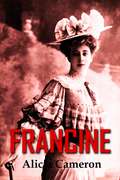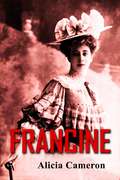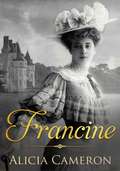- Table View
- List View
Frances Burney and the Arts: Frances Burney And The Theater Arts
by Francesca SagginiThis collection of essays by leading scholars in Burney studies provides an innovative, interdisciplinary critical consideration of the relationship of one of the major authors of the long English Romantic period with the arts. The encounter was not devoid of tensions and indeed often required a degree of wrangling on Burney’s part. This was a revealing and at times contentious dialogue, allowing us to reconstruct in an original and highly focused way the feminine negotiation with such key concepts of the late Enlightenment and Romanticism as virtue, reputation, creativity, originality, artistic expression, and self-construction. While there is now a flourishing body of work on Frances Burney and, more broadly, Romantic women authors, this book concentrates for the first time on the rich artistic and material context that surrounded, supported, and shaped Frances Burney’s oeuvre.
Frances Burney’s “Evelina”: The Book, its History, and its Paratext (New Directions in Book History)
by Svetlana KochkinaEvelina, the first novel by Frances Burney, published in 1778, enjoys lasting popularity among the reading public. Tracing its publication history through 174 editions, adaptations, and reprints, many of them newly discovered and identified, this book demonstrates how the novel’s material embodiment in the form of the printed book has been reshaped by its publishers, recasting its content for new generations of readers. Four main chapters vividly describe how during 240 years, Evelina, a popular novel of manners, metamorphosed without any significant alterations to its text into a Regency “rambling” text, a romantic novel for “lecteurs délicats,” a cheap imprint for circulating libraries, a yellow-back, a book with a certain aesthetic cachet, a Christmas gift-book, finally becoming an integral part of the established literary canon in annotated scholarly editions. This book also focuses on the remodelling and transformation of the paratext in this novel, written by a woman author, by the heavily male-dominated publishing industry. Shorter Entr’acte sections discuss and describe alterations in the forms of Burney’s name and the title of her work, the omission and renaming of her authorial prefaces, and the redeployment of the publisher’s prefatorial apparatus to support particular editions throughout almost two-and-a-half centuries of the novel’s existence. Illustrated with reproductions of covers, frontispieces, and title pages, the book also provides an illuminating insight into the role of Evelina’s visual representation in its history as a marketable commodity, highlighting the existence of editions targeting various segments of the book market: from the upper-middle-class to mass-readership. The first comprehensive and fully updated bibliography of English and translated editions, adaptations, and reprints of Evelina published in 13 languages and scripts appears in an appendix.
Frances Ellen Watkins Harper: African American Reform Rhetoric and the Rise of a Modern Nation State (Studies in American Popular History and Culture)
by Michael StancliffA prominent early feminist, abolitionist, and civil rights advocate, Frances Ellen Watkins Harper wrote and spoke across genres and reform platforms during the turbulent second half of the nineteenth century. Her invention of a new commonplace language of moral character drew on the persuasive and didactic motifs of the previous decades of African-American reform politics, but far exceeded her predecessors in crafting lessons of rhetoric for women. Focusing on the way in which Harper brought her readers a critical training for the rhetorical action of a life commitment to social reform, this book reconsiders her practice as explicitly and primarily a project of teaching. This study also places Harper's work firmly in black-nationalist lineages from which she is routinely excluded, establishes Harper as an architect of a collective African-American identity that constitutes a political and theoretical bridge between early abolitionism and 20th-century civil rights activism, and contributes to the contemporary portrayal of Harper as an important theorist of African-American feminism whose radical egalitarian ethic has lasting relevance for civil rights and human rights workers.
Frances Power Cobbe (Elements on Women in the History of Philosophy)
by Alison StoneThis Element introduces the philosophy of Frances Power Cobbe (1822-1904), a very well-known moral theorist, advocate of animal welfare and women's rights, and critic of Darwinism and atheism in the Victorian era. After locating Cobbe's achievements within nineteenth-century British culture, this Element examines her duty-based moral theory of the 1850s and then her 1860s accounts of duties to animals, women's rights, and the mind and unconscious thought. From the 1870s, in critical response to Darwin's evolutionary ethics, Cobbe put greater moral weight on the emotions, especially sympathy. She now criticised atheism for undermining morality, emphasised women's duties to develop virtues of character, and recommended treating animals with sympathy and compassion. The Element links Cobbe's philosophical arguments to her campaigns for women's rights and against vivisection, brings in critical responses from her contemporaries, explains how she became omitted from the history of philosophy, and shows the lasting importance of her work.
Frances Willard
by Ruth BordinFrances Willard (1839-98), national president of the WCTU, headed the first mass organization of American women, and through the work of this group, women were able to move into public life by 1900. Willard inspired this process by her skillful leadership, her broad social vision, and her traditional womanly virtues. Although a political maverick, she won the support of the white middle class because she did not appear to challenge society's accepted ideals.
Frances and Bernard
by Carlene BauerA &“dazzling and gorgeously written&” novel of art, faith, and life-changing friendship inspired by the correspondence of Flannery O&’Connor and Robert Lowell (Ann Packer). In the summer of 1957, two writers are immersed in their craft at an artist&’s colony nestled in upstate New York when chance brings them together. Frances, a country northerner, as committed to her solitude as she is her faith, and Bernard, a gregarious Bostonian with a propensity towards mania and grand gestures, find themselves forming a friendship, and then a courtship, as they each discover a kindred spirit beneath the obvious differences between them. But, as they become inexorably entwined in each other&’s lives, they struggle with the dependence of their romance and the conflict it causes with their own dreams. Inspired by the lives of Flannery O&’Connor and Robert Lowell, who formed an unlikely connection after meeting at Yaddo in the late fifties, and told in a series of intimate letters between the protagonists, Frances and Bernard is a touching and bittersweet look at what happens when love, desire, hope, faith, and friendship collide. &“Recalling 20th-century masters like Graham Greene and Walker Percy . . . Bauer is herself a distinctive stylist who can write about Simone Weil or Kierkegaard with wit and charm.&” —The New York Times Book Review &“Engrossing . . . Funny, sweet and sad. A lovely surprise.&” —Publishers Weekly, starred review &“A novel of stunning subtlety, grace, and depth . . . compos[ed in] dueling letters of breathtaking wit, seduction, and heartbreak.&” —Booklist, starred review
Francesca
by Bertrice SmallNew York Times bestselling author Bertrice Small continues her glorious historical-romance series featuring four sisters in Renaissance Florence who have anything but marriage on their minds.... Giovanni Pietro d'Angelos selected his oldest daughter's husband, and the marriage proved to be a disaster. He offers to give his next oldest daughter, Francesca, more latitude in choosing a husband than her sister had. But the arrogant beauty has no desire to marry, and she drives every potential suitor away. The Duke of Terreno Boscoso seeks a wife for his heir, Rafaello, and invites Francesca, along with several other possible brides, to come meet him. Francesca's parents think it's a good match, but she refuses to consider it until her father makes her a promise: If he does not suit, you may return. She is therefore shocked when, not long after they meet, Rafaello chooses her as his bride and her parents agree to his proposal--without her consent. Furious and feeling betrayed, Francesca flees into the woods and takes shelter at an inn. There, she earns her keep as a servant--and meets an unlikely suitor who steals her heart. But the future remains uncertain for the runaway bride, who is still promised to another.
Francesca
by Sylvia AndrewFrancesca Shelwood is mortified when Marcus Carne reappears in her life—he stole the most magical, illicit kisses from the young, innocent Francesca! And she swore never to forgive him after being punished for her "wanton" behavior….Now, on her inheritance, Marcus has returned to offer the unimaginable—marriage! An indignant Francesca refuses, but very soon she walks headlong into danger—and the only man ready to sacrifice his life, and reputation, for her sake is Marcus….
Francesca Caccini at the Medici Court
by Catharine R. Stimpson Suzanne G. CusickA contemporary of Shakespeare and Monteverdi, and a colleague of Galileo and Artemisia Gentileschi at the Medici court, Francesca Caccini was a dominant musical figure there for thirty years. Dazzling listeners with the transformative power of her performances and the sparkling wit of the music she composed for more than a dozen court theatricals, Caccini is best remembered today as the first woman to have composed opera. Francesca Caccini at the Medici Court reveals for the first time how this multitalented composer established a fully professional musical career at a time when virtually no other women were able to achieve comparable success. Suzanne G. Cusick argues that Caccini's career depended on the usefulness of her talents to the political agenda of Grand Duchess Christine de Lorraine, Tuscany's de facto regent from 1606 to 1636. Drawing on Classical and feminist theory, Cusick shows how the music Caccini made for the Medici court sustained the culture that enabled Christine's power, thereby also supporting the sexual and political aims of its women. In bringing Caccini's surprising story so vividly to life, Cusick ultimately illuminates how music making functioned in early modern Italy as a significant medium for the circulation of power.
Francesca Caccini at the Medici Court: Music and the Circulation of Power (Women In Culture And Society Ser.)
by Suzanne G. CusickA &“priceless&” study of the life and career of the Renaissance-era Italian who was the first woman to have composed an opera (Gender & History).&“Extraordinary in its breadth, its detail, its insight, and its worth to all participants in early music…. Its contribution is not limited to the musical world, however, as Cusick&’s remarkable command and analysis of her material…has immense value for scholars engaged in cultural studies, performance studies, history, politics, or the study of difference.&”—Renaissance Quarterly A contemporary of Shakespeare and Monteverdi, and a colleague of Galileo and Artemisia Gentileschi at the Medici court, Francesca Caccini was a dominant musical figure there for thirty years. Dazzling listeners with the transformative power of her performances and the sparkling wit of the music she composed for more than a dozen court theatricals, Caccini is best remembered today as the first woman to have composed opera. Francesca Caccini at the Medici Court reveals for the first time how this multitalented composer established a fully professional musical career at a time when virtually no other women were able to achieve comparable success. Suzanne G. Cusick argues that Caccini&’s career depended on the usefulness of her talents to the political agenda of Grand Duchess Christine de Lorraine, Tuscany&’s de facto regent from 1606 to 1636. Drawing on Classical and feminist theory, Cusick shows how the music Caccini made for the Medici court sustained the culture that enabled Christine&’s power, thereby also supporting the sexual and political aims of its women. In bringing Caccini&’s surprising story so vividly to life, Cusick ultimately illuminates how music making functioned in early modern Italy as a significant medium for the circulation of power.
Francesca Woodman's Dark Gaze: The Diazotypes and Other Late Works
by Claire RaymondFocusing on the later work of the American photographer Francesca Woodman (1958-1981), Claire Raymond takes up the question of the disintegrative condition of the art she produced in the last year of her life. Departing from the techniques of her earlier compositions, Woodman worked in the diazotype process for many of these late pieces, most importantly the monumental Blueprint for a Temple. Raymond shows that through her use of diazotype, a medium that breaks down when exposed to light, Woodman created art that is both supremely evocative aesthetically and inherently unstable physically. Woodman, Raymond contends, was imaginatively responding to the end of the durable image, a historical reality acknowledged in the way her work plays the ephemeral and evanescent against the monumental and enduring. Raymond focuses on the theoretical and the curatorial issues surrounding Woodman's diazotypes, a thematic and practical distress that haunts much of her later art, especially the artist's book and photo series Some Disordered Interior Geometries and Portrait of a Reputation. Rather than conceiving of Woodman herself as fragile, an artist chronicling and seeming to yearn for her own disappearance, Raymond juxtaposes Woodman's career-spanning documentation of her own image against other post-war witnesses of trauma - an artist standing in the museum ruins where she emerges most distinctly as a figure of postmodernity.
Francesco Bartolomeo Conti: His Life and Music (Routledge Revivals)
by Hermine Weigel WilliamsFirst Published in 1999, Hermine Weigel Williams’ study draws on more than thirty years of research to fill this noticeable lacuna , and presents here the first full scale life and works of the composer for over ninety years. Part One of the book surveys the biographical aspects of Conti’s career. Appointed court theorist at the age of nineteen, Conti was promoted to court composer in 1713-14. Williams examines Conti’s creative collaborations with some of the leading poet-librettists of the day, and the influence of his music that can be identified in works by Telemann, Bach and Handel. Part Two comprises close analyses of Conti’s compositions: his instrumental music, cantatas, operas, intermezzos, oratorios and sacred music. Williams reveals Conti as a composer who constantly experimented with a wide range of French, German and Italian ideas and techniques to create his own diverse musico-dramatic style.
Francesco Robortello: Architectural Genius of the Humanities (Routledge Studies in Renaissance and Early Modern Worlds of Knowledge)
by Marco SgarbiThis book explores the intellectual world of Francesco Robortello, one of the most prominent scholars of the Italian Renaissance. From poetics to rhetoric, philology to history, topics to ethics, Robortello revolutionised the field of humanities through innovative interpretations of ancient texts and with a genius that was architectural in scope. He was highly esteemed by his contemporaries for his acute wit, but also envied and disparaged for his many qualities. In comparison with other humanists of his time such as Carlo Sigonio and Pier Vettori, Robortello had a deeply philosophical vein, one that made him unique not only to Italy, but to Europe more generally. Robortello’s role in reforming the humanities makes him a constituent part of the long-fifteenth century. Robortello’s thought, however, unlike that of other fifteenth-century humanists, sprung from and was thoroughly imbued with a systematic, Aristotelian spirit without which his philosophy would never have emerged from the tumultuous years of the mid-Cinquecento. Francesco Robortello created a system for the humanities which was unique for his century: a perfect union of humanism and philosophy. This book represents the first fully fledged monograph on this adventurous intellectual life.
Franchise: The Golden Arches In Black America
by Marcia ChatelainFrom civil rights to Ferguson, Franchise reveals the untold history of how fast food became one of the greatest generators of black wealth in America. Often blamed for the rising rates of obesity and diabetes among black Americans, fast food restaurants like McDonald’s have long symbolized capitalism’s villainous effects on our nation’s most vulnerable communities. But how did fast food restaurants so thoroughly saturate black neighborhoods in the first place? In Franchise, acclaimed historian Marcia Chatelain uncovers a surprising history of cooperation among fast food companies, black capitalists, and civil rights leaders, who—in the troubled years after King’s assassination—believed they found an economic answer to the problem of racial inequality. With the discourse of social welfare all but evaporated, federal programs under presidents Johnson and Nixon promoted a new vision for racial justice: that the franchising of fast food restaurants, by black citizens in their own neighborhoods, could finally improve the quality of black life. Synthesizing years of research, Franchise tells a troubling success story of an industry that blossomed the very moment a freedom movement began to whither.
Franchised States and the Bureaucracy of Peace (Rethinking Peace and Conflict Studies)
by Niels Nagelhus SchiaThis book examines a new type of state formation evoked by the rise of transnational rule, what Schia calls franchised states. Drawing on anthropological studying-through fieldwork within the UN organization, he demonstrates how peacebuilding activities turned Liberia into an object of governing, whereby the UN, in seeking to build the state, also became the state. The sovereign state of Liberia here emerges as a franchise rather than a self-contained entity. Two implications follow: First, that international peacebuilding turns post-conflict countries into clients of the international community. Second, that "sovereignty" is no longer exclusively associated with the state: it is organized in and through specific practices of governing where a state actor is only one among a range of actors. With these findings, the book moves beyond previous work on peacebuilding by focusing on the unbundling of sovereignty. It contributes to the literature on the changing forms of sovereignty by showing the specific ways in which sovereignty is organized, packaged and enacted, often by actors working under international auspices. This book will be of interest to practitioners and students interested in international organizations, international relations, the study of international practices, UN, and peacebuilding.
Franchising McChurch
by Thomas White Jon Mark YeatsWe live in a fast-food nation, where the service is efficient, the products are peer-tested, and size is king. And this consumer-driven approach is seeping into the church. Across the country, churches are creating entertaining, pop culture-savvy services that feel more market-driven than ministry. On the menu? A proven blend of dynamic music, high-tech dazzle, and topical teachings. And just like any successful product, churches are launching campuses that build on their brand. But is the franchised church of today leading to the disenfranchised believers of tomorrow? Though thousands flock to these services, how many lives are truly being changed? Have we traded real truth for relevancy? Franchising McChurch takes an honest look at the rise of consumer-minded ministries. Authors Thomas White and John Yeats tackle a spiritual shift that is raising provocative issues such as: The blurry line between entertainment and evangelism A marketing approach to ministry The warped yardstick for measuring church success Feel-good messages that avoid tough truths Candid and compelling, Franchising McChurch calls us back to the heart of Christ's church, and shares the Biblical design for delivering meaningful, life-changing ministry in a fast-food world.
Franchising in America: The Development of a Business Method, 1840-1980
by Thomas S. DickeUsing a series of case studies from five industries, Dicke analyzes franchising, a marketing system that combines large and small firms into a single administrative unit, strengthening both in the process. He studies the franchise industry from the 1840s to the 1980s, closely examining the rights and obligations of both the parent company and the franchise owner.Originally published in 1992. A UNC Press Enduring Edition -- UNC Press Enduring Editions use the latest in digital technology to make available again books from our distinguished backlist that were previously out of print. These editions are published unaltered from the original, and are presented in affordable paperback formats, bringing readers both historical and cultural value.
Franchthi Neolithic Pottery, Volume 1: Classification and Ceramic Phases 1 and 2 (Excavations at Franchthi Cave, Greece #8)
by Karen D. VitelliThe first of two systematic reports on the more than one million sherds of pottery recovered from the Franchthi Cave in Greece.Over two and a quarter metric tons of pottery were recovered from Neolithic deposits at Franchthi and Paralia which will significantly increase our understanding of Neolithic pottery and Neolithic society in southern Greece. Through the development and application of a new system of ceramic classification, this fascile analyzes the pottery from the earlier Neolithic deposits as a direct reflection of the human behavior that produced it.“A highly innovative study that foregrounds the decision-making and technological choices of Neolithic potters.” —Antiquity“Imaginative, rigorous and admirably lucid study.” —Journal of Hellenic Studies
Franchthi Neolithic Pottery, Volume 2: The Later Neolithic Ceramic Phases 3 to 5 (Excavations at Franchthi Cave, Greece #10)
by Karen D. VitelliThe second of two systematic reports on the more than one million sherds of pottery recovered from the Franchthi Cave in Greece.Over two and a quarter metric tons of pottery were recovered from Neolithic deposits at Franchthi and Paralia which will significantly increase our understanding of Neolithic pottery and Neolithic society in southern Greece. Through the development and application of a new system of ceramic classification, this fascile analyzes the pottery from the earlier Neolithic deposits as a direct reflection of the human behavior that produced it.“A highly innovative study that foregrounds the decision-making and technological choices of Neolithic potters.” —Antiquity“Imaginative, rigorous and admirably lucid study.” —Journal of Hellenic Studies
Franci's War: A Woman's Story of Survival
by Franci Rabinek EpsteinThe engrossing memoir of a spirited and glamorous young fashion designer who survived World War ll, with an afterword by her daughter, Helen Epstein.In the summer of 1942, twenty-two year-old Franci Rabinek--designated a Jew by the Nazi racial laws--arrived at Terezin, a concentration camp and ghetto forty miles north of her home in Prague. It would be the beginning of her three-year journey from Terezin to the Czech family camp in Auschwitz-Birkenau, to the slave labor camps in Hamburg, and Bergen Belsen. After liberation by the British in April 1945, she finally returned to Prague.Franci was known in her group as the Prague dress designer who lied to Dr. Mengele at an Auschwitz selection, saying she was an electrician, an occupation that both endangered and saved her life. In this memoir, she offers her intense, candid, and sometimes funny account of those dark years, with the women prisoners in her tight-knit circle of friends.Franci's War is the powerful testimony of one incredibly strong young woman who endured the horrors of the Holocaust and survived.
Francia contra los robots
by Georges BernanosEn 1948, el reconocido escritor de inspiración mística Georges Bernanos desapareció, dejando el manuscrito de un último libro, publicado póstumamente: Francia contra robots. Esta apasionada defensa de la libertad es un desafío a las idolatrías paganas de ganancia y fuerza, con una increíble actualidad. Esta diatriba contra la "sociedad de las máquinas" es un grito futurista, para señalar una sociedad en la que es posible llevar una vida digna de seres humanos.Esta visionaria obra señala una Sociedad futura donde la tecnología domina a los seres humanos y los deshumaniza. Atacando la conformidad burguesa en nombre de sus creencias católicas, el autor afirma "que no es ni de izquierda ni derecha" y los conflictos internos son especialmente la fuente de las maldades que disminuyen al hombre y todas las tiranías que lo aplastan.“El peligro no está en las máquinas, de lo contrario deberíamos hacer este sueño absurdo de destruirlas por la fuerza, a la manicura de los iconoclastas que, rompiendo las imágenes, se halagaron aniquilando también las creencias. El peligro no está en la multiplicación de máquinas, sino también en el número cada vez mayor de hombres, que desde su infancia, solo desean lo que las máquinas pueden proveer”.
Francie
by Karen EnglishA distinctive new voice in children's fictionFrancie lives with her mother and younger brother, Prez, in rural Alabama, where all three work and wait. Francie's father is trying to get settled in Chicago so he can move his family up North.Unfortunately, he's made promises he hasn't kept, and Francie painfully learns that her dreams of starting junior high school in an integrated urban classroom will go unfulfilled. Amid the day-to-day grind of working odd jobs for wealthy white folks on the other side of town, Francie becomes involved in helping a framed young black man to escape arrest -- a brave gesture, but one that puts the entire black community in danger. In this vivid portrait of a girl in the pre--Civil Rights era South, first-time novelist Karen English completes Francie's world using lively vernacular and a wide array of flesh-and-blood characters.Francie is a 2000 Coretta Scott King Author Honor Book.
Francine
by Alicia Cameron Carmen SantarpinoNella Londra edoardiana, la dama di una lady è scacciata nel freddo. Ma Francine non conosce la parola disperazione e quindi incontreremo una giovane donna notevole esempio di resilienza. NOTA: Francine è una breve storia per kindle.
Francine
by Alicia Cameron Marisa PavanEn la época Eduardiana, en Londres, la criada de una dama es despedida una noche fría. Pero la desesperación no caracteriza a Francine y conocemos a una joven con un poder de resistencia notable. Francine puede ser la criada de una dama pero es perfectamente capaz de cuidarse a sí misma, incluso cuando la despiden. En realidad, descubrimos que Francine está interesada en el bienestar de muchas mujeres y es cruel en su propósito por ayudarlas.
Francine
by Alicia Cameron Heloisa BirsenekNa Londres eduardiana, a camareira de uma dama é posta para fora no frio. Mas desespero não faz parte dos planos de Francine e conhecemos uma jovem de resiliência notável. Observação: Francine é um conto para kindle. Comentários dos leitores: “Este é um adorável conto(...) [Francine] é leve, encantador e divertido.” “Uma nova personagem divertida com quem Alicia Cameron pode nos deliciar” “Personagem fantástica!” “Este é um conto fantástico! A autora consegue escrever de modo a passar uma ideia clara de como a vida deve ter sido para moças como Francine. É único no sentido de que a heroína não é uma dama da alta sociedade, mas uma empregada bastante empreendedora. (...) Eu REALMENTE quero ler mais do trabalho dessa autora!” “Amo as histórias e os livros de Alicia Cameron” “Francine é uma personagem inesquecível” “Eu queria que a história nunca terminasse!” “Uma mulher que transforma a si mesma e todas as mulheres que encontra” "Uma história de quebrar e aquecer o coração. Uma luta dos oprimidos pelos seus pares, não devendo nada a clássicos como ‘Capitães da Areia’”
